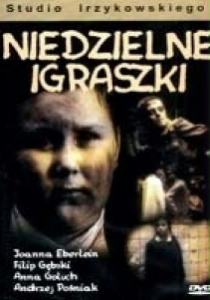SUNDAY GAMES [1983]

year:
- 1983
runtime:
- 54 min
directed by:
- Robert Gliński
written by:
- Robert Gliński, Grzegorz Torzecki
director of photography:
- Jerzy Rękas, Grzegorz Torzecki
cast:
- Joanna Eberlein,, Filip Gębski,, Anna Goluch,, Elżbieta Helman,, Jacek Janiszewski
music by:
- Lech Brański
produced by:
- Studio Filmowe im. Karola Irzykowskiego
producer:
- Krzysztof Waś
awards:
-
• Gdynia Film Festival 1987 – journalists’ award
• Gdańsk 1987 (Young Polish Cinema) – Grand Prix of the Minister of Youth
• Koszalin (Film Debut Festival "Young and Cinema” 1987 – best directorial debut award for Robert Gliński
• Mannheim (MTF) 1987 – FIPRESCI award
• Mannheim (MTF) 1987 – International Catholic Film Award
About the film
Black-and-white tape, short film, set in a particular place and at a particular time. And yet this film by Robert Gliński is a poignant take on universal issues. The director shows children's behaviour that mirrors the actions of adults. The children follow the "exemplary" actions of the older characters, they do not, however, share their anxieties and fears, as they lack their distance to the world. That is why they are such a clear, bitter reflection of their parents.
It is Sunday morning, 1953, in a typical Warsaw courtyard, when the local “mad girl” can be heard screaming, “He died! He died! ... He's dead...". The people gathered around the figure of the Virgin Mary are commenting on the death of Stalin, only to disperse and after a moment the yard is left to the children. Some parents go to church, others join the procession organised in honour of the deceased. Events on the streets are signalled by the sound of distant church bells and fragments of funeral speeches coming from the loudspeakers. Elements of the "adult" reality inevitably invade the world of the children's playground. Józek, who is about to leave for a holiday in Rabka, pretends to his friends that he is going "to that funeral," and to prove his words he pins medals he stole from his father to his chest. He also takes a set of Rycho’s father’s pre-war medals in return for a promise to lend him a rifle. The driver of a car who is to drive Józek to the station immediately notices the Virtuti Militari medal on his lapel and, thinking that it belongs to Józek’s father, takes all the medals from the boy and "goes to report everything”. The would-be “delegate to the funeral” has to stay with the children who ridicule him, so in order to repair his tarnished authority, he arranges more games. Without much success, he tries to terrorise Rycho, upset with the loss of his father's medals, with a rifle. Then, he picks up the idea to collect money "for Stupid Blacha", whom the children enjoy bullying. The game is interrupted by Marysia, a lonely girl who always stays away from the centre of courtyard life and is excluded from the children’s community. This time she suffers no consequences because a car arrives with some men who have come to question Józek about his parents. They also interrogate the caretaker – Rycho’s father – who has already noticed that his carefully hidden medals are missing. The children keep on playing, this time pretending to be statues. Józek’s leadership aspirations once again find an outlet in directing the events. Rycho loses the game and as a penalty he has to strangle a cat, which he tries to do, blackmailed that otherwise his father would be told about the mystery of his missing medals. Maryśka grabs the cat. The other children, under Józek’s leadership, chase her through scaffoldings and attics. Affected by the tension and emotions, the girl kills the cat, provoking the wrath of the children. They solemnly entomb the cat, then attack Maryśka and bury her in the sand. Custodians come to take Józek to the orphanage. The boy's parents have been arrested. In the deserted yard, children are practicing military drills once again. With difficulty, they repeat, after the eldest boy, the words of the oath: “I swear to fight against the enemy…”.



